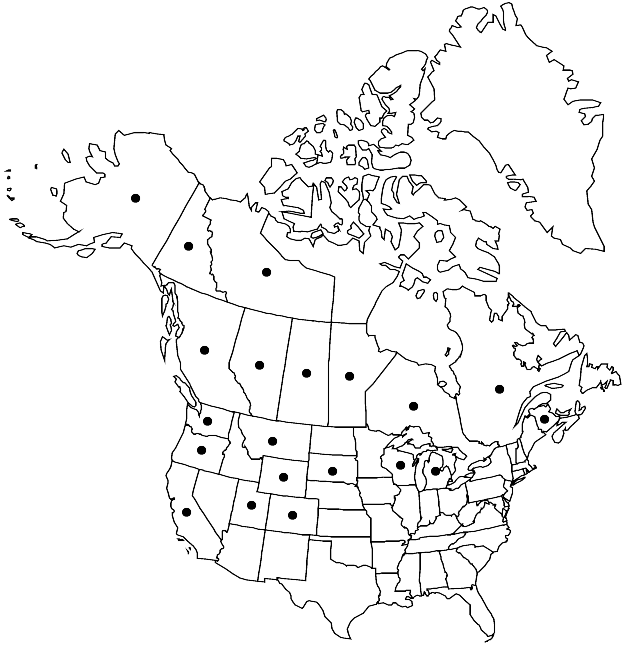Difference between revisions of "Drepanocladus longifolius"
Coll. Nom. Broth., 10. 1909.
FNA>Volume Importer |
imported>Volume Importer |
||
| (2 intermediate revisions by 2 users not shown) | |||
| Line 62: | Line 62: | ||
|publication year=1909 | |publication year=1909 | ||
|special status= | |special status= | ||
| − | |source xml=https:// | + | |source xml=https://bitbucket.org/aafc-mbb/fna-data-curation/src/2e0870ddd59836b60bcf96646a41e87ea5a5943a/coarse_grained_fna_xml/V28/V28_461.xml |
|genus=Drepanocladus | |genus=Drepanocladus | ||
|species=Drepanocladus longifolius | |species=Drepanocladus longifolius | ||
Latest revision as of 21:36, 5 November 2020
Plants medium-sized to large. Stems pinnate or irregularly branched. Stem leaves falcate or rarely almost straight, ovate, triangular, or broadly rounded-triangular, gradually narrowed to apex, concave, 1.5–6.4 × 0.5–1.3 mm; base erectopatent to patent, insertion slightly curved; margins entire or frequently partly finely denticulate; apex long-acuminate, acumen gradually differentiated, in straight-leafed plants ± plane; costa single, excurrent or longly so, rarely ending few cells before apex, strong; alar region transversely triangular or narrowly so, reaching from margin 66–80% distance to costa; ratio of medial laminal cell length (µm) to leaf length (mm) 16.5–23.9(–25.5). Sexual condition dioicous.
Habitat: Mineral-and nutrient-rich habitats, submerged in lakes, pools, ox-bow lakes, water-filled kettle holes, periodically dry pools, small and usually slowly flowing brooks, springs, periodically wet depressions in meadows
Elevation: low to high elevations
Distribution

Alta., B.C., Man., N.B., N.W.T., Ont., Que., Sask., Yukon, Alaska, Calif., Colo., Mich., Mont., Oreg., S.Dak., Utah, Wash., Wis., Wyo., South America, Eurasia, Indian Ocean Islands (Kerguelen Islands), Australia.
Discussion
Drepanocladus longifolius differs from all other North American species of Drepanocladus in its excurrent leaf costa; because of this trait, it can hardly be confused with any other taxon of Drepanocladus (in the broad sense) in North America except Sarmentypnum trichophyllum. However, the shoots are radially branched and shoots and branch apices pencil-like in S. trichophyllum, its leaf margins are more strongly denticulate, it frequently becomes red when emergent whereas D. longifolius never is red, and the axillary hairs consist of 2–7 distal cells that are brown when young (1 or 2 hyaline cells in D. longifolius).
Selected References
None.